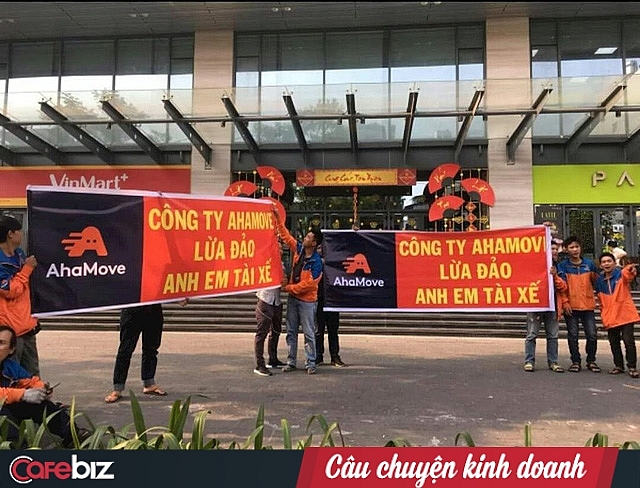Ride-hailing and delivery companies lose ground to Grab
 |
| Ahamove drivers protesting the company's policies in January |
Only several days ago, CEO Nguyen Vu Duc and the deputy CEO of Go-Viet also quit over uncertainties with their legal status and their relation to Go-Jek, as it is uncertain whether Go-Viet is an Indonesian company with Go-Jek as the parent company or whether Go-Jek is just an investor/shareholder.
Similarly, Ahamove, the on-demand delivery startup developed by Scommerce, has replaced several senior leaders, letting go CEO Nguyen Xuan Truong among others who were disagreeing with the company’s strategy and development plan. Chief technology officer (CTO) Pham Huu Ngon will be the new CEO of Ahamove.
Ngon is an IT engineer and rather well-known in tech startup circles. If in multi-national corporations the CFO (chief finance officer) is the person to usually succeed the CEO, it is reasonable for the CEO position to be ceded to the CTO at technology companies.
Ahamove is a project of Scommerce Group founded by Luong Duy Hoai and Phuoc Tran, who left only one year later. Another food delivery project of Scommerce and founded by Nguyen Xuan Truong, Lala, has also quit the game three months ago.
Ahamove was also in hot water in this January when a number of driver partners gathered in front of the company office on Thanh Thai Street (District 10, Ho Chi Minh City) to protest Ahamove’s unilateral removing of rewards and locking accounts.
Some riders also hung up banners saying "Ahamove cheats drivers" in front of the office, while others provided ample coverage by live streaming and sharing pictures and videos on social networks.
Almost at the same time with the resigning of Ahamove’s CEO, Go-Viet also saw changes in its high-level personnel. Are these shows of "weak" startups tilting off balance as Grab is pouring millions of dollars into its Vietnamese operations? What can the succeeding personnel conjure up to keep afloat in such overwhelming competition?
| Last August, Go-Jek expanded to its first foreign market, Vietnam, providing motorbike ride-hailing services, delivery, and planning to launch car-hailing. Go-Viet did not charge riders commission during the first months of operation, which allowed it to seize 35 per cent of the Ho Chi Minh City market in only two months. However, the subsequent introduction of 20 per cent commission (equivalent to Grab) made riders unhappy and reduced the company’s competitiveness. |
What the stars mean:
★ Poor ★ ★ Promising ★★★ Good ★★★★ Very good ★★★★★ Exceptional
Related Contents
Latest News
More News
- VIFC in Ho Chi Minh City officially launches (February 12, 2026 | 09:00)
- VNPAY and NAPAS deepen cooperation on digital payments (February 11, 2026 | 18:21)
- Vietnam financial markets on the rise amid tailwinds (February 11, 2026 | 11:41)
- New tax incentives to benefit startups and SMEs (February 09, 2026 | 17:27)
- VIFC launches aviation finance hub to tap regional market growth (February 06, 2026 | 13:27)
- Vietnam records solid FDI performance in January (February 05, 2026 | 17:11)
- Manufacturing growth remains solid in early 2026 (February 02, 2026 | 15:28)
- EU and Vietnam elevate relations to a comprehensive strategic partnership (January 29, 2026 | 15:22)
- Vietnam to lead trade growth in ASEAN (January 29, 2026 | 15:08)
- Japanese business outlook in Vietnam turns more optimistic (January 28, 2026 | 09:54)

 Tag:
Tag:

























 Mobile Version
Mobile Version